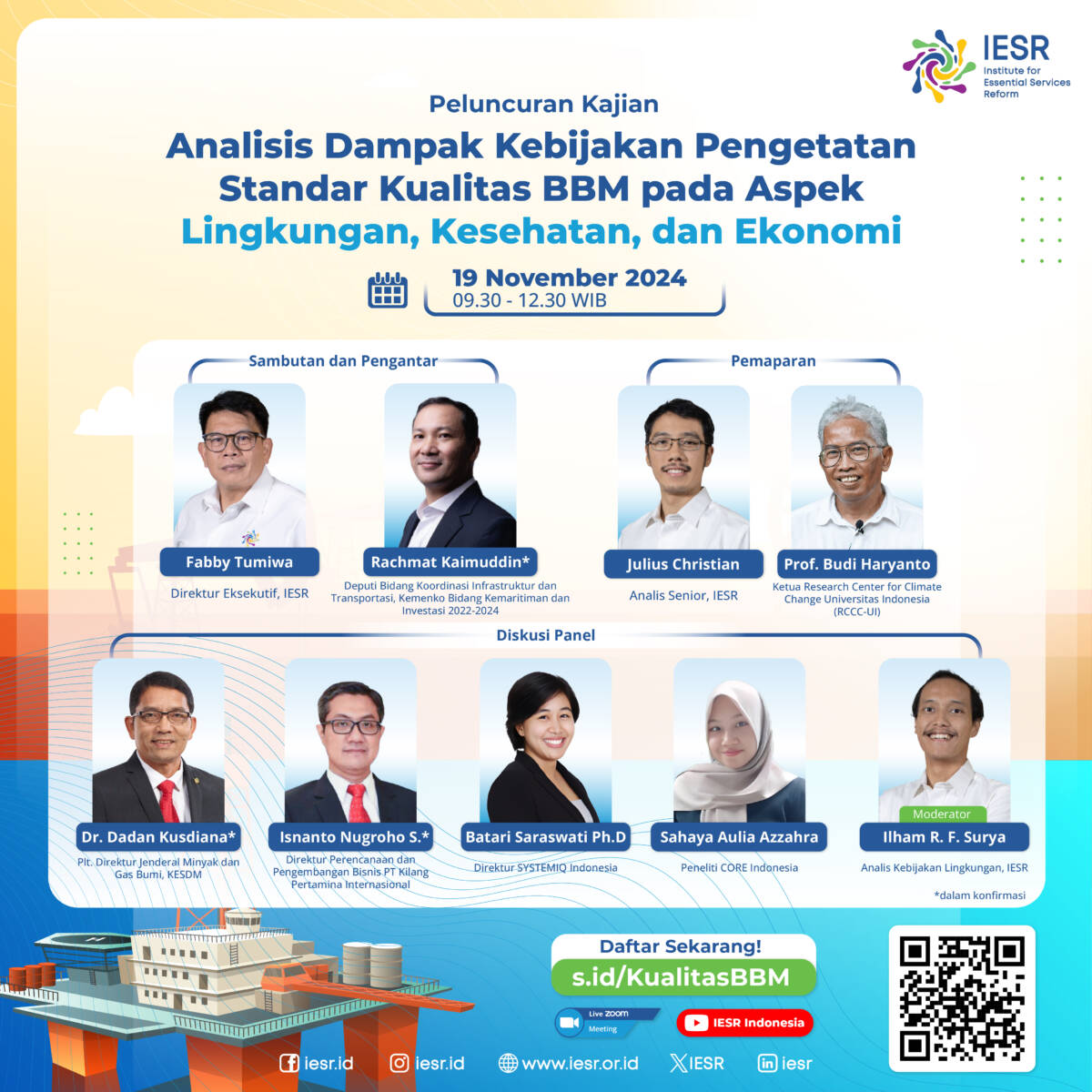
Report Launch and Discussion: Impact Analysis of Fuel Quality Standard Tightening Policy on Environmental, Health, and Economic Aspects
Replay Streaming
Background
Indonesia is undergoing rapid industrialization and urbanization, and due to the increase in motor vehicles urban areas are now facing serious air pollution problems. The main contributors to this problem are motor vehicle emissions (32 – 41% in the wet season and 42 – 57% in the dry season), coal-fired power plants (14% in the wet season), and open burning (11% in the wet season and 9% in the dry season) (Vital Strategies and ITB, 2018). Poor air quality has serious health impacts, including an increase in respiratory and cardiovascular diseases, and is responsible for thousands of premature deaths each year (WHO, 2019). If air quality-related disease cases are accumulated in the form of estimated medical care costs, the economic loss reached IDR 38.5 trillion in 2010, or equivalent to IDR 60 trillion by calculating inflation in 2020 (UNEP, 2018; Vital Strategies, 2020).
In July – August 2023, Indonesia experienced extremely poor air quality, with levels of particulate matter (PM2.5) and other pollutants reaching dangerous concentrations, especially in urban centers such as Jakarta and Surabaya. These pollution spikes led to an increase in respiratory illnesses, increased hospitalizations, and significant disruptions to daily life, including school closures and reduced outdoor activities. Given these critical impacts, there is an urgent need for comprehensive measures to improve air quality. Improved fuel quality standards are emerging as one important solution, promising reduced harmful emissions and healthier, cleaner air (Li et al., 2020).
Industry players, especially manufacturers of passenger cars, commercial buses and trucks, have also expressed their support by responding to PermenLHK No. 20/2017 by effectively producing Euro 4 vehicles from 2018 (for passenger cars) and 2022 (for buses and trucks). However, this is not accompanied by the provision of fuel with quality that complies with the requirements stipulated in PermenLHK No 20/2017, namely having a minimum RON number of 91 and a maximum sulfur content of 50 ppm for gasoline and a minimum cetane number of 51 and a maximum sulfur content of 50 ppm for diesel. As of 2023, only 2 types of Pertamina fuel products meet these requirements, namely Pertamax Turbo (gasoline) and Pertamina Dex (diesel), which account for only about 1% of total fuel sales.
To create a supportive ecosystem for the implementation of better quality fuels, stakeholder engagement ranging from fuel producers and automotive manufacturers to the general public is essential. In addition, public awareness campaigns will play an important role in informing citizens about the benefits of cleaner fuels and encouraging behavioral change towards sustainable transportation practices.
The benefits of improved fuel quality standards are not only limited to environmental benefits such as air quality, but can also have an effect on the economy, where the implementation of higher fuel quality standards can potentially stimulate growth by creating green jobs in the renewable energy and automotive sectors. In terms of health costs, pollution-related diseases will also contribute to economic savings. Socially, improving air quality will improve the quality of life for millions of Indonesians, reducing the burden of disease and promoting a healthier and more productive society. In addition, aligning with global environmental standards will strengthen Indonesia’s international standing, attract foreign investment, and demonstrate leadership in sustainable development.
The launch and discussion of this report intends to inform and spark discussion among the public and policy makers regarding the impact of the policy of tightening fuel quality standards. The study that forms the basis of the report is a collaboration of several civil society organizations and think tanks, namely the Institute for Essential Services Reform (IESR), Center of Reform on Economics (CORE Indonesia), Committee for the Elimination of Leaded Gasoline (KPBB), and Research Center for Climate Change University of Indonesia (RCCC-UI). By organizing this event, the study is expected to provide a comprehensive picture of the impact of the planned policy.
Objective
- To disseminate a comprehensive analysis of the potential impacts of implementing higher fuel quality standards on the economy, environment, and public health.
- To explore the readiness of stakeholders involved in the implementation of higher fuel quality standards.
- Increase public awareness and support for the government’s planned policy to increase vehicle fuel quality standards.
Presentation
Fuel Emission, Health Impacts, Cost of Illness and Energy Transition Scenario in Indonesia _ Budi Haryanto – RCCC UI
IESR-Budi-Haryanto
Impact Analysis of Fuel Quality Improvement Policy _ Julius Christan – IESR
Analisis-Dampak-Kebijakan-Peningkatan-Kualitas-BBM-Julius-Christan_IESR
Speakers
-
Dr. Ir. Dadan Kusdiana M.Sc - Secretary General of the National Energy Council (DEN)
-
Fabby Tumiwa - Chief Executive Officer (CEO) - IESR
-
Rachmat Kaimuddin - Deputi Bidang Koordinasi Infrastruktur dan Transportasi - Kemenko Bidang Kemaritiman dan Investasi 2022-2024
-
Ilham Surya- Environmental Policy Analyst - IESR
-
Immakulata Soraya - Communications Officer Project CASE for SEA - IESR
-
Julius Christian - Senior Analyst IESR
-
Isnanto Nugroho S. - Direktur Perencanaan dan Pengembangan Bisnis PT Kilang Pertamina Internasional
-
Batari Saraswati Ph.D. - Director SYSTEMIQ Indonesia
-
Fathya Nirmala Hanoum - Researcher of CORE Indonesia
-
Prof. Dr. R. Budi Haryanto - Epidemiology Research Center Climate Change University of Indonesia (RCCC - UI)

